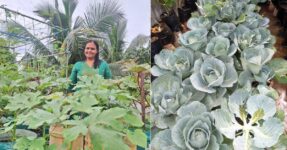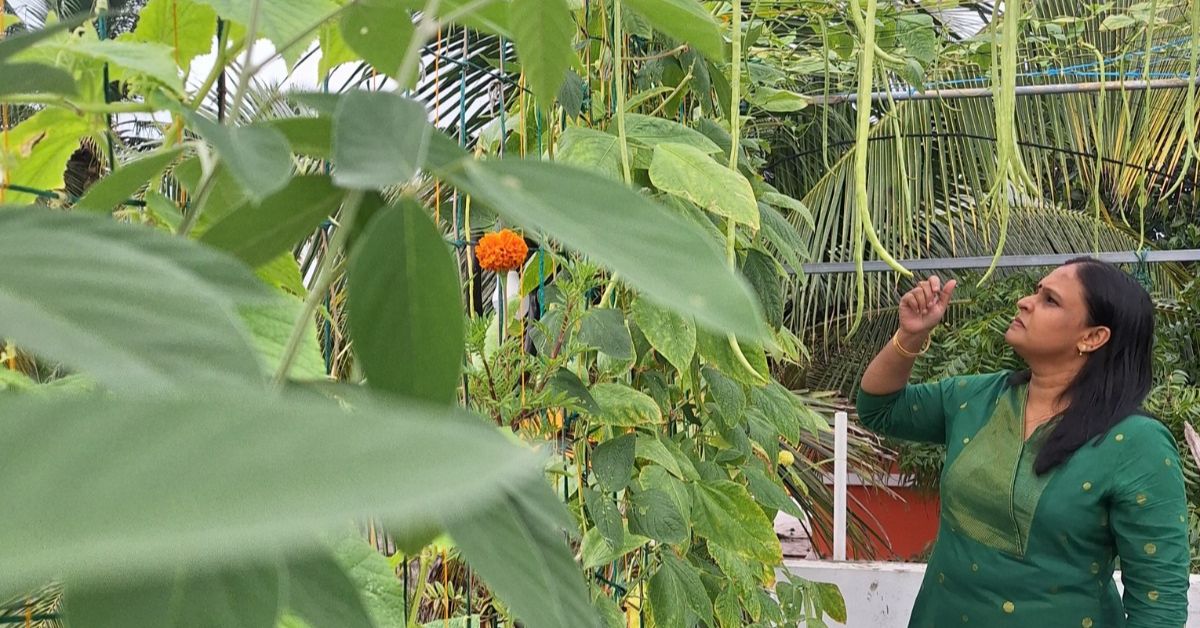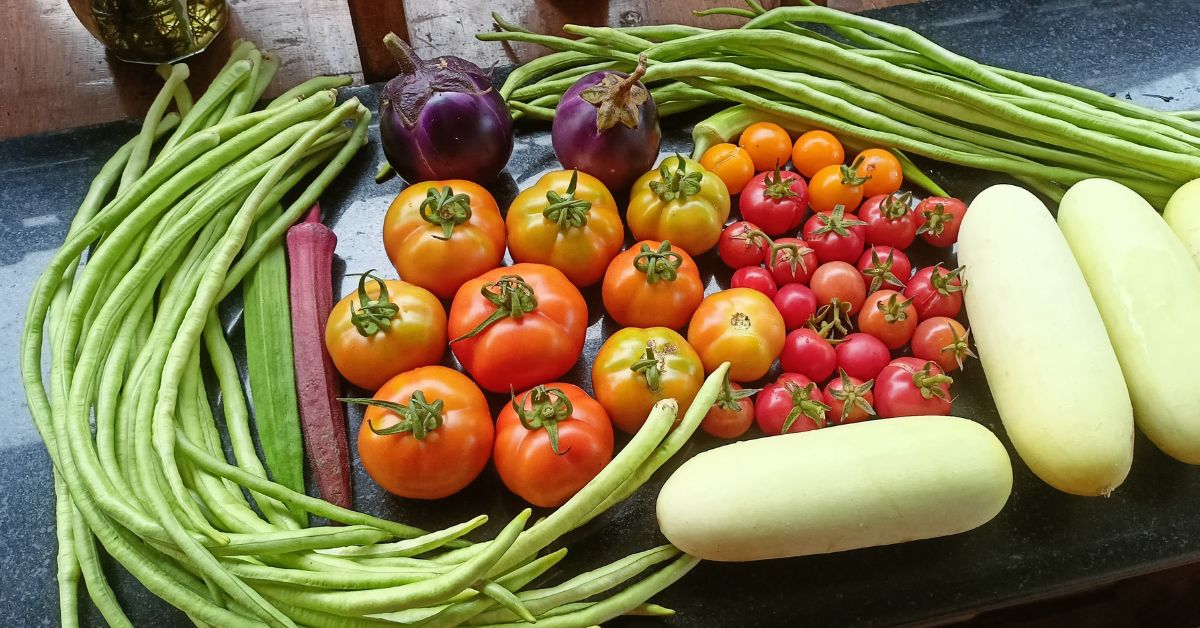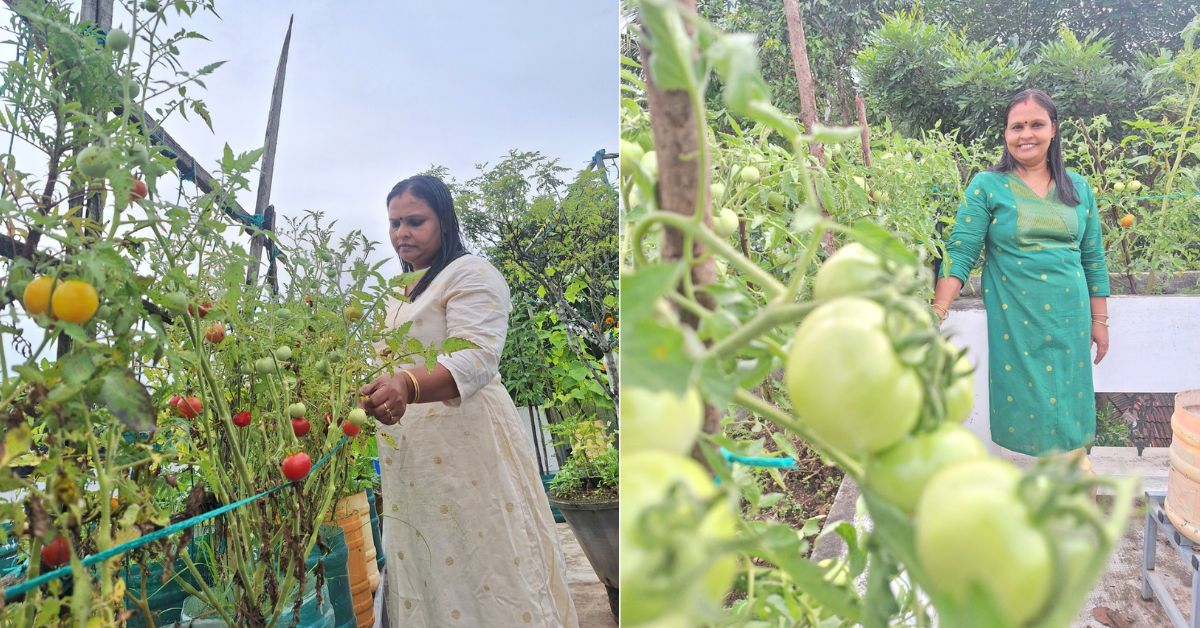
Kerala Homemaker Grows Organic Vegetables on Terrace at Home
Born and brought up in Vellarada village near the Tamil Nadu-Kerala border, amidst the lush greenery of nature, Padma Suresh deeply missed her village. Raised in a family rooted in farming traditions, she inherited a love for agriculture from her father. Young Padma would spend most of her evening after school in the fields, learning the art of organic farming.
This early exposure instilled a profound connection with the land and an appreciation for homegrown produce.
“I would tag along with my father to the field and help him in managing small chores of the field. That’s how I learnt different ways to grow vegetables organically,” she says.
After moving to Thiruvananthapuram post-marriage, she took these memories to her in-laws’ home. Faced with the challenge of limited space, Padma felt the absence of fresh and homegrown vegetables in the bustling urban landscape.
Disenchanted with the taste and quality of store-bought vegetables, she decided to take matters into her own hands and transform her small 500-square-foot terrace into a flourishing vegetable garden.
Now 48, Padma has devoted the past 12 years to cultivating a thriving garden — boasting 200 plants of 20 varieties of vegetables. With Onam around the corner, she is stocking supplies to prepare feasts for the upcoming festival!

By growing her own food, the gardener has not only found a way to provide a consistent supply of organic vegetables to her family but also a way to generate a secondary income. We sat down with her to learn more about her passion for achieving self-sufficiency in growing food for her family.
More than just a hobby
Initially, Padma focussed on growing flowers such as orchids and jasmine. She only turned to growing her own vegetables after reading multiple news articles that highlighted the perils of consuming chemical-laden vegetables that dominated the market.
“It is not an unknown fact that chemical-laden vegetables are detrimental to human health. I thought just by sparing some time in the morning and evening, I could get healthy nutritious and chemical-free food for my family. Additionally, I did not like the taste of food cooked using vegetables I bought from the market. So, I wanted to grow my own vegetables,” she shares.
She transitioned to growing a variety of essential vegetables — such as chillies, cherry tomatoes, beans, cucumbers, brinjals, curry leaves, cauliflowers, okra, and more. With over 200 plants thriving in grow bags, the terrace garden has become a constant source of joy and sustenance for Padma; and also a link to her rural roots.
“I only have to purchase potatoes, garlic, tamarind, and onions from the market. Other than these vegetables, my terrace garden supplies all the basic produce,” she points out.

While the vegetables from her terrace are sufficient to provide for her family of four, Padma sells the extra harvest in the market. So, growing vegetables is not just a mere hobby for her but also a mode of income. “Every Sunday, a lot of gardeners reach Gandhi Bhawan to sell organically grown vegetables. I too have a dedicated stall where I sell extra vegetables. Within an hour, all my vegetables are sold out. This organic farming business earns me up to Rs 1,000,” she adds.
“By eliminating the need to purchase vegetables from the market, I have not only achieved self-sufficiency but also significantly reduced my monthly expenses on vegetables by saving around Rs 1,500 per month,” she says.
Padma says with little effort, anyone can grow vegetables organically at home. She relies on natural fertilisers like vermicompost, cow dung, poultry dung, bonemeal, and neem cake, steering clear of harmful chemicals.
Additionally, she employs innovative organic farming methods like preparing liquid fertilisers from jaggery and fish, which act both as a nutrient source and pesticide for the plants. Sharing the technique to prepare this fertiliser, she says, “Take mathi (sardine) fish and chop it into small pieces. Then, add 1.5 kg of jaggery and mix it with the fish. Keep the contents in an airtight container. Stir it every day.”
“The fertiliser will be ready for use after 45 days. Mix 3 ml of this liquid fertiliser in one litre of water and add to plants. It should be given to plants at an interval of 15 days. This acts both as a fertiliser and natural pesticide,” she shares.

Padma also regularly monitors her garden for pests. “In the night, insects usually leave the plant. At that time, I try to manually remove them from plants and destroy them. I also use biopesticide to spray it on plants to get rid of bugs,” she shares.
This proactive approach not only safeguards the crops but also ensures the well-being of her family by providing them with nutritious, chemical-free food.
Her husband Suresh Ettan, who is currently working in an oil and gas company in Oman, misses the organic food cooked by Padma. “As I am a vegetarian, I have limited food choices here. Secondly, I do not like the taste of vegetables. For the past four years, I have been surviving on plain rice, lentils, and curd,” he says.
“Whenever I sit down to eat, I deeply miss our home-cooked food. Every morning, my wife sends me a good morning message. And along with it, she shares photos of her day’s harvest. I take pride in showcasing those photos to my colleagues,” he adds.
Meanwhile, Padma says she finds solace and connection to her village through the traditional recipes and flavours of homegrown vegetables. “I can now prepare feasts with veggies from my garden for festive occasions like Onam. We enjoy savouring the freshness of cucumbers, cherry tomatoes, and other garden delights,” she says.
“This not only provides physical nourishment but also enriches my soul. It offers me a sense of purpose that transcends material gains. All my worries fade away when I am busy nurturing my plants,” she remarks.
Edited by Pranita Bhat. All photos: Suresh Ettan.



